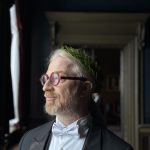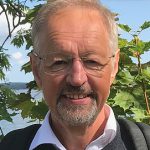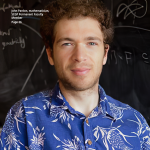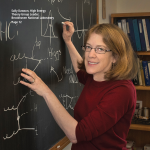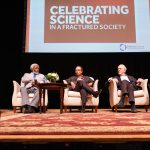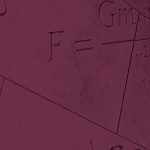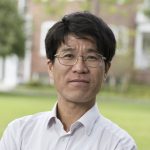“Find Out What Interests You, Follow That Goal.” A Conversation with Klaus Hulek
Klaus Hulek sits down with the Center’s Deputy Director, and long-time collaborator, Samuel Grushevsky for a conversation about his life, research, goals, and advice.
Conformal Field Theory, Integrability, and Geometry: March 11-15, 2024
Organized by: Nikita Nekrasov (Simons Center for Geometry and Physics, Stony Brook University) Vladimir Korepin (C.N. Yang Institute for Theoretical Physics, Stony Brook University) Stefano Negro (University of York) Sergei Lukyanov (Rutgers University) Quantum Field Theory (QFT) is an indispensable tool in modern theoretical physics. It is essential to the study of particle physics and … Read more
Entanglement, thermalization, and holography: April 8-12, 2024
Organized by: Matthias Kaminski (Alabama) Natalie Klco (Duke) Berndt Mueller (Duke) Andreas Schaefer (Regensburg) Sebastian Waeber (Technion) Laurence Yaffe (U Washington) This workshop will survey new insights and future challenges of some foundational problems of theoretical physics, including the evolution of entanglement and complexity in isolated quantum systems. Our aim is to confront recent insights … Read more
The Magical Quality of Number Theory: A Conversation with John Pardon
In September 2022, the Simons Center welcomed John Pardon, SCGP’s fifth permanent faculty member. In November, Pardon met with fellow Simons Center faculty member Simon Donaldson for a discussion.
Looking Forward: 10 Years After the Higgs Discovery
By Sally Dawson, High Energy Theory Group Leader, Brookhaven National Laboratory
The Della Pietra Lectures: Celebrating Science in a Fractured Society
By Lorraine Walsh Edited by Keating Zelenke
Science Playwriting Competition – Staged Readings May 8, 2024
The Simons Center for Geometry and Physics and the C. N. Yang Institute for Theoretical Physics, announce a CALL FOR PLAYS for the 2023 Science Playwriting Competition.
Solving N=4 super-Yang-Mills theory via Scattering Amplitudes: January 8, 2024 – March 8, 2024
Organizing by: Benjamin Basso (Ecole Normale Superieure), Lance Dixon (SLAC/Stanford U.) Jaroslav Trnka (UC Davis) Anastasia Volovich (Brown) This program will bring together physicists and mathematicians with expertise in different facets of particle scattering in planar N=4 super-Yang-Mills theory, in order to try to solve the theory for generic values of the coupling and kinematical … Read more
New Directions in Far from Equilibrium Integrability and Beyond: April 29 – May 3, 2024
Organizing by: Alexander Abanov (Stony Brook University) Boris Altshuler (Columbia University) Natan Andrei (Rutgers University) Hrachya Babujian (Alikhanian National Lab, Yerevan Physics Institute) Lea Santos (University of Connecticut) Tigran Sedrakyan (University of Massachusetts) Emil Yuzbashyan (Rutgers University) The field of far from equilibrium many-body quantum systems is on the verge of a breakthrough both theoretically … Read more
Della Pietra Lecture Series Presents Tadashi Tokieda *ZOOM Lecture*
The Della Pietra Lecture Series is pleased to present a special zoom lecture by Professor Tadashi Tokieda. Wednesday February 8 at 5:00pm











